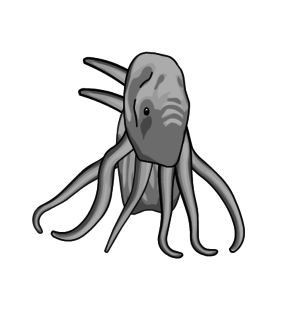Cha-Etvoy-Irf: Difference between revisions
From MicrasWiki
Jump to navigationJump to search
Newzimiagov (talk | contribs) No edit summary |
Newzimiagov (talk | contribs) No edit summary |
||
| Line 2: | Line 2: | ||
[[File:Rangecha.png|thumb| In red, the known range of the Cha-Etvoy-Irf.]] | [[File:Rangecha.png|thumb| In red, the known range of the Cha-Etvoy-Irf.]] | ||
Found commonly in the shallow waters around Northern [[Corum]], the '''Cha-Etvoy-Eda''' uses its tentacles to walk, rather than swim, around the ocean floor. Roughly the size of the average human, this creature is known to attempt to eat whatever crosses its path, whether it be a human, a boat, or another Cha-Etvoy-Irf. Cannibalism is common amongst this species, which features two large antennae-like protrusions that can sometimes be seen above the surface of the water. | Found commonly in the shallow waters around Northern [[Corum]], the '''Cha-Etvoy-Eda''' uses its tentacles to walk, rather than swim, around the ocean floor. Roughly the size of the average human, this creature is known to attempt to eat whatever crosses its path, whether it be a human, a boat, or another Cha-Etvoy-Irf. Cannibalism is common amongst this species, which features two large antennae-like protrusions that can sometimes be seen above the surface of the water. | ||
Found in only 5 out of 20 [[Pallisican]] cities in Corum, this species is uncommon. | |||
[[Category:Species]][[Category:Passio-Corum]] | [[Category:Species]][[Category:Passio-Corum]] | ||
Revision as of 00:04, 21 November 2016
Found commonly in the shallow waters around Northern Corum, the Cha-Etvoy-Eda uses its tentacles to walk, rather than swim, around the ocean floor. Roughly the size of the average human, this creature is known to attempt to eat whatever crosses its path, whether it be a human, a boat, or another Cha-Etvoy-Irf. Cannibalism is common amongst this species, which features two large antennae-like protrusions that can sometimes be seen above the surface of the water.
Found in only 5 out of 20 Pallisican cities in Corum, this species is uncommon.

